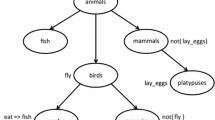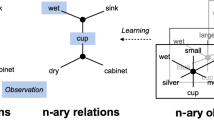Abstract
Robot knowledge is considered to endow service robots with intelligence. In the real environments, robot knowledge needs to represent dynamically changing world. Despite its advantages for semantic knowledge of service robots, robot knowledge may be instantiated and updated by using imperfect sensing data, such as misidentification of object recognition. In case of using commercially available visual recognition system, incorrect knowledge instances are created and changed frequently due to object misidentification and/or recognition failures. In this work, a robust semantic knowledge handling method under imperfect object recognition is proposed to instantiate and update robot knowledge with logical inference by estimating confidence of the object recognition results. The following properties may be applied to determine misidentifications in logical inference: temporal reasoning to represent relationships between time intervals, statistical reasoning with confidence of object recognition results. To show validity of our proposed method, experimental results are illustrated, where commercial visual recognition system is employed.
Similar content being viewed by others
References
Thielscher M (2000) Representing the knowledge of a robot. In: The international conference on principles of knowledge representation and reasoning (KR-2000), Morgan Kaufmann, San Mateo, CA, 2000, pp 109–120
Hertzberg J (2008) Using semantic knowledge in robotics. Robot Auton Syst 56(11): 875–877
Suh IH, Lim GH, Hwan W, Suh H (2007) Ontology-based multi-layered robot knowledge framework (OMRKF) for robot intelligence. In: IEEE/RSJ international conference on intelligent robots and systems 2007, San Diego, CA, USA, Oct 29–Nov 2, 2007, pp 429–436
Russell SJ, Norvig P (2003) Artificial intelligence: a modern approach, 2nd edn. Pearson Education. Inc
Lee DS, Lim GH, Suh IH (2009) Rule-based object detection for robust instance registration in robot-centered knowledge framework. In: International symposium on artificial life and robotics (AROB 12th ’07), Beppu, Japan
Munich ME, Ostrowski J, Pirjanian P (2005) ERSP: a software platform and architecture for the service robotics industry. In: Intelligent robots and systems, 2005 (IROS 2005). 2005 IEEE/RSJ international conference, pp 460–467
Son TC, Tu PH, Baral C (2004) Planning with sensing actions and incomplete information using logic programming. In: Proceedings LPNMR-2004. Lecture notes in computer science/lecture notes in artificial intelligence, vol 2923. Springer, Berlin, Germany, pp 261–274
Obeid N, Rao RB (2007) A step toward a universal theory of failure handling. Diagnostyka 1(41): 5–14
Thrun S, BurgarW, Fox D (2002) Probabilistic robotics. The MIT Press, ACM, New York, NY, USA
Shmulevich I, Dougherty ER, Kim S, Zhang W (2002) Probabilistic Boolean networks: a rule-based uncertainty model for gene regulatory networks. Bioinformatics, Oxford University Press, pp 261–274
Jahanian H, Hossein-Zadeh GA, Soltanian-Zadeh H, Ardekani BA (2004) Controlling the false positive rate in fuzzy clustering using randomization: application to fMRI activation detection. Magn Reson Imaging 22: 631–638
Lim GH, Suh IH (2008) weighted Action-coupled Semantic Network (wASN) for robot intelligence. In: Proceedings of the IEEE/RSJ international conference on intelligent robots and systems (IROS), Nice, France
Kyoshgoftaar TM (2004) Rule-based noise detection for software measurement data. In: IEEE international conference on information reuse and integration 2004. IRI 2004, Las Vegas, Nevada, USA, pp 302–307
Yang J, Liu J, Wang J, Sii H, Wang H (2006) A generic rule-base inference methodology using the evidential reasoning approach—RIMER. IEEE Trans Syst Man Cybern (Part A: Syst Hum) 36: 266–285
Loyer Y, Straccia U (2003) Default knowledge in logic programs with uncertainty. In: International conference on logic programming, vol 2916 of LNCS, Mumbai, India, pp 466–480
Ding Z, Peng Y (2004) A probabilistic extension to ontology language OWL. In: Proceedings of the 37th Hawaii international conference on system sciences-2004, vol 4, p 40111a
Smith MK, Welty C, McGuinness DL (2004) OWL web ontology language guide. W3C recommendation, vol 10 (2004)
Brachman R, Levesque H (2004) Knowledge representation and reasoning. Morgan Kaufmann Publishers, San Francisco
Allen JF (1991) Planning as temporal reasoning. In: The second international conference on principles of knowledge representation and reasoning, Cambridge, MA, April, 1991
Heard A, Pensky M (2006) Confidence intervals for reliability and quantile functions with application to NASA space flight data. IEEE Trans Reliab 2006 55: 591–601
Baader F, Calvanese D, Mcfuinness D, Nardi D, Patel-schneider P (2003) The description logic handbook, chap 2. Cambridge university press
Chuho Y, Suh IH, Lim GH, Jeong S, Choi B (2008) Cognitive representation and Bayesian model of spatial object contexts for robot localization. In: 15th international conference on neural information processing of the Asia-Pacific neural network assembly (ICONIP 2008), Auckland, New Zealand
Author information
Authors and Affiliations
Corresponding author
Additional information
This work was performed for the Intelligent Robotics Development Program, one of the 21st Century Frontier R&D Programs funded by Korea Ministry of Commerce, Industry and Energy.
Rights and permissions
About this article
Cite this article
Lim, G.H., Suh, I.H. Robust robot knowledge instantiation for intelligent service robots. Intel Serv Robotics 3, 115–123 (2010). https://doi.org/10.1007/s11370-010-0063-6
Received:
Accepted:
Published:
Issue Date:
DOI: https://doi.org/10.1007/s11370-010-0063-6




